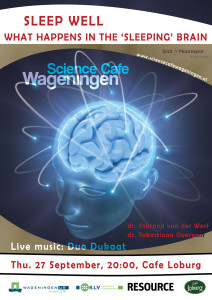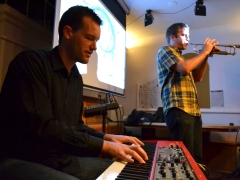Summary
We spend about thirty percent of our lives sleeping. While people follow diets and spend hours in the gym to improve their health, there is very little public attention for the importance of a healthy sleep. To appreciate its importance, we first need to understand why we need sleep, and what happens in our brain while we are sleeping? In this edition of Science Café Wageningen, two experts will discuss this fascinating, but poorly understood topic. Neurobiologist dr. Ysbrand van der Werf will discuss what happens in our brain while we are asleep and why this is important for our normal functioning. Somnologist/neurophysiologist dr. Sebastiaan Overeem studies patients with sleep disorders, and will discuss what these can tell us about the importance of normal sleep.
Dr. Ysbrand van der Werf(1971) studied biology and psychology in Groningen and obtained his PhD in Amsterdam. As a senior researcher he is working at the Dutch Institute for Neurosciences (NIN) and as assistant professor at the medical centre of Vrije Universiteit in Amsterdam. He wants to connect fundamental neurosciences and related practical applications. He has developed a research line on sleeping disorders. He recently discovered that when persons observe a skill that they wish to learn right before going to sleep, their performance in that skill improves the following day. Since 2010 he is a member of ‘De Jonge Akadamie’ a platform for young scientists in the Royal Netherlands Academy of Arts and Sciences.

Somnologist / neurophysiologist dr. Sebastiaan Overeem (1977) obtained his PhD at Leiden University Medical Centre after studying Medicine in the same university. He is currently working as an assistant professor at the Department of Neurology at Radbouw University in Nijmegen, and as a somnologist at the Sleep Medicine Centre Kempenhaeghe. His interests are into Narcolepsy, sleep disorders in Parkinson disease, parasomnias and Restless Legs Syndrome. He is investigating the mechanism(s) responsible for the positive effects of ‘powernaps’ in patients with Parkinson’s disease. In 2010 he received a prestigious Vidi grant for his research.
Gallery


